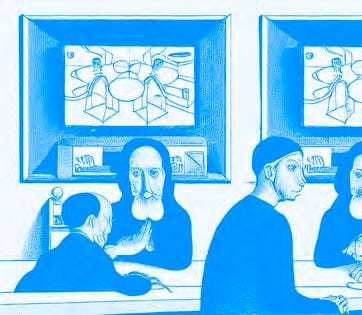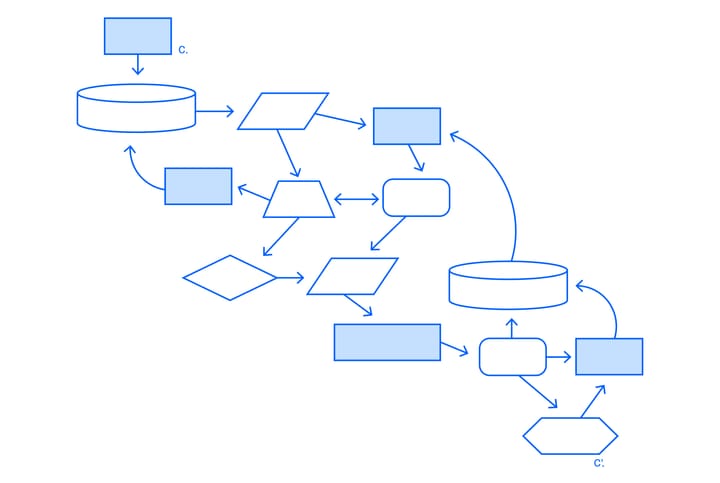Barflies
No matter what you're at the Apple Genius Bar for, it is a bewildering, sci-fi-sleek, calamity where you know nothing of your fate, and your torturers are tortured themselves.

It’s Tuesday afternoon, and I am sitting in a crowded bar that does not serve alcohol. My bartender, an endomorphic soyjak in a polo shirt with a chin strap, has been ignoring me for 45 minutes. He sees to other customers with quirky small talk reminiscent of Joss Whedon dialogue—a self-referential, overly familiar parody of “arch.” My flight response screams “run,” my fight response screams “murder this man,” but neither is an option, so I dumbly wait. He is a “genius,” and my entire livelihood is staked on this chipper castrato.
And I’m not the only one. This dive is so packed with barflies, some of us can’t even find a stool and are forced to mill around like confused Rambouillets desperately seeking their Australian Shepherd (sure he’s a pain, but he knows where to go), finding only a sea of “You betcha!” rictus stretched over T-800 skeletons.
Bureaucracy is a reliable boogeyman, especially for Americans. During the Cold War, it was the campfire stories of Soviet bread lines that kept the USA god-fearing. Today, your cultural touchstone might be Terry Gilliam’s Brazil, or Kafka’s The Trial, or (for the basic bitches) George Orwell’s 1984. (The latter is a tragically underrated victim of its own success, due in part to the fact that it gets assigned to minds not yet totally able to appreciate it. Seriously, it has one of the most romantic passages ever written, and it involves a woman delaying another clandestine tryst because she’s on her period). There’s also the old “why don’t they make the whole plane out of the black box” favorite, the Department (or Bureau, depending on your state) of Motor Vehicles, where you are forced to take a number, sit in a chair and wait among the hoi polloi. Like some peasant.
Of course, Brazil, The Trial, and 1984 are all fiction (spare me arguments to the contrary, women definitely have sex on their periods). Even stories of Soviet rationing are rather exaggerated, taking place early on during the first five years of high-octane, rapid industrialization (1931 to 1935), and only again towards the actual collapse during Perestroika. So that leaves the DMV as the only comparable experience. But there is an essential difference between the DMV and the Genius Bar: everyone knows where they are in line at the DMV because it is on public display. You know your number and you know what number is next. You know what is going on at the DMV.
Not so at the Apple Genius Bar, truly a new rung of hell. No matter what you’re there for, it is a bewildering, sci-fi-sleek calamity where you know nothing of your fate, and your torturers are tortured themselves.
When the employee Genius training manual was leaked in 2012, it became obvious that the chaos is intentional, part and parcel of a program designed to deceive customers and employees as to the nature of their relationships (to the tech the company and each other), inveigle both into a sense of security they are to believe is provided by the Great and Powerful Steve, and obfuscate the necessity of order. In the words of Sam Biddle at Gizmodo:
No need to mince words: This is psychological training. Much of this training is oriented around euphemistic denial. Did your computer crash? No, it “stops responding.” Never say crash. What if some Apple software has a bug? Wrong: there’s an “issue,” “condition,” or simply “situation.” You don’t “eliminate” a problem—you “reduce” it.
No Apple products are hot—at most they’re “warm.”
There is no “service” at Apple, there is “support” (from “geniuses,” no less), which the company describes as “concierge-style.” You can theoretically book a spot online, but, as customers attest, this is the equivalent of the crosswalk button connected to absolutely nothing, existing only to give pedestrians the illusion of agency. There are floating desks on portable stands, but no signage to indicate any specialization. There are also “floaters,” little NPC’s—prodigies, not geniuses—who appear to be in their own purgatory of side quests, none of which have anything to do with you.
The Genius Bar Wikipedia entry, which appears to been written by Apple, reads:
LCD screens behind the Bar play looped videos which offer tips to customers waiting for help. Stools can be found in front of the Bar for people to sit and chat with each other or with employees.
There used to be a literal “red phone” behind the counter at the Genius Bar, an emergency line to specialists with more skills and training than the grunts on the floor, but it’s gone now. There is no longer a central command, not for customers, not for Geniuses. God is dead, and Apple killed Him.
Customer service is now all about obscuring who is in charge, both to employee and customer. Even in the same building, we are as atomized and alienated as in the suburbs: too close for comfort but too far for intimacy. The modernism of straight lines has given way to Silicon-Valley-slick libertarian dreams. Now you orbit a celestial behemoth (come on, the Apple Store looks like a Kubrick set for a reason) in stasis with all the other space debris. You don’t chat with your fellow barflies, and you don’t chat with employees. You look at the cracked screen on your phone with all the love and fear of Stockholm Syndrome, deep down hoping that maybe, if you’re lucky, you’ll fall to earth and burn up in the atmosphere.
Say what you will about bread lines, at least there was a line.
■
Amber A’Lee Frost is a writer and erstwhile co-host of the podcast, Chapo Trap House. Her debut book, Dirtbag: Essays, is out now.



